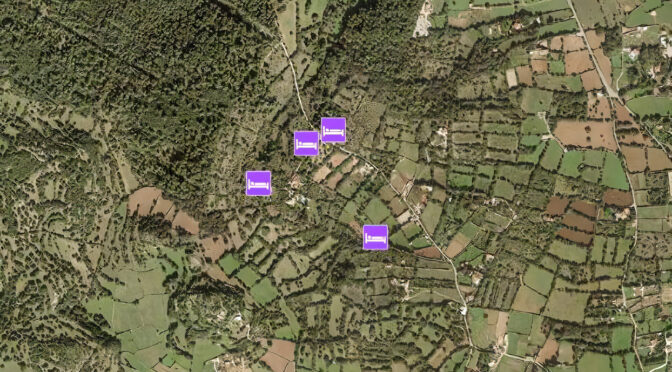Views: 1166
GOB has called on the Menorca Island Council to review the tourist permits granted to 53 buildings that lack recognized urban legality. Such a situation is in direct conflict with the law, and the group requests an official review, as these licenses would likely be considered void or based on declarations that fail to comply with current regulations.
The tourist rental data published by the Island Council reveal several cases of buildings located in rural areas without an approved Special Plan or homes declared non-compliant, in addition to other constructions on rustic land that may also be in violation of urban planning laws.
Acts null by law
According to the Administrative Procedure Law, any express or presumed acts that go against legal norms and result in the acquisition of rights or privileges without the necessary legal requirements are null by law. In this sense, tourist rental licenses granted on rustic land to holiday homes, residential homes marketed for short-term stays, or changes of use in existing buildings to establish tourist accommodations in homes that were not previously legalized do not meet the essential criteria for such privileges.
Likewise, declarations of responsibility for starting a tourist activity in buildings that do not comply with urban planning regulations should be reviewed, closed, and penalized under Article 106 of the Balearic Islands Tourism Law (Law 8/2012).
Buildings must be old houses with agricultural use
The Balearic Islands Tourism Law specifies that tourist stays must occur in buildings classified as residential homes. Illegal houses do not meet this criteria. Since the implementation of the 2003 Territorial Plan, holiday homes on rustic land are only allowed in buildings constructed before 1960, located on a property where agricultural, livestock, or forestry activities are actively certified by the Ministry of Agriculture.
Therefore, any licenses or declarations processed after that period that do not meet these requirements, are contrary to these basic conditions. Under the new 2023 Territorial Plan, tourist rentals on rustic land are no longer permitted, as activities in these areas are now directed towards rural hotels, agrotourism, or farm stays.
Rural nuclei and non-compliant buildings
Many of the cases identified in Menorca involve buildings located in rural nuclei, areas where constructions have arisen without urban planning permits. These are neither residential homes nor older than 1960, nor are they related to professional agricultural activities. It is also important to note that in these so-called “hortals” areas, tourist use is not among the permitted activities.
Other cases involve buildings that have been declared non-compliant, meaning they never had urban planning permits.
Violations and penalties
The Tourism Law is clear when it states that, among other irregularities, registering a building as a home intended for tourist stays in accordance with the tourism regulations without the home having a mandatory town planning title that enables it for its use must be considered an infraction for change of use. Furthermore, it declares the need to cease the activity, without prejudice to any criminal, civil, or administrative liabilities, as soon as any essential omission or failure to meet regulatory requirements is detected.
When such cases are found, the relevant tourism authority must require the responsible party to restore the legal status to what it was before the activity began and initiate a sanction procedure. If inaccuracies are found, the authority can impose both the cessation of the activity and a sanction, including the permanent removal of the building from the tourism register.
State law (Ley del Suelo) also clearly addresses this issue. It states that if a declaration of responsibility does not meet the necessary requirements for the intended use, the administration must take steps to stop the unauthorized use.
Reducing the tourism bubble with concrete actions
A week ago, GOB revealed that more than 20 illegal tourist rental cases had been detected in Menorca (currently 26), where properties were promoting tourist rentals without being authorized for such use. Today, more than fifty new cases of illegal buildings offering tourist rentals have been added to the official databases.
The detailed list of each case, along with the applicable legal arguments, should expedite the Island Council’s action on this matter. The organization will continue to address the problems caused by the excessive tourism pressure on Menorca, including the strain on natural resources and the loss of opportunities and quality of life for residents.

